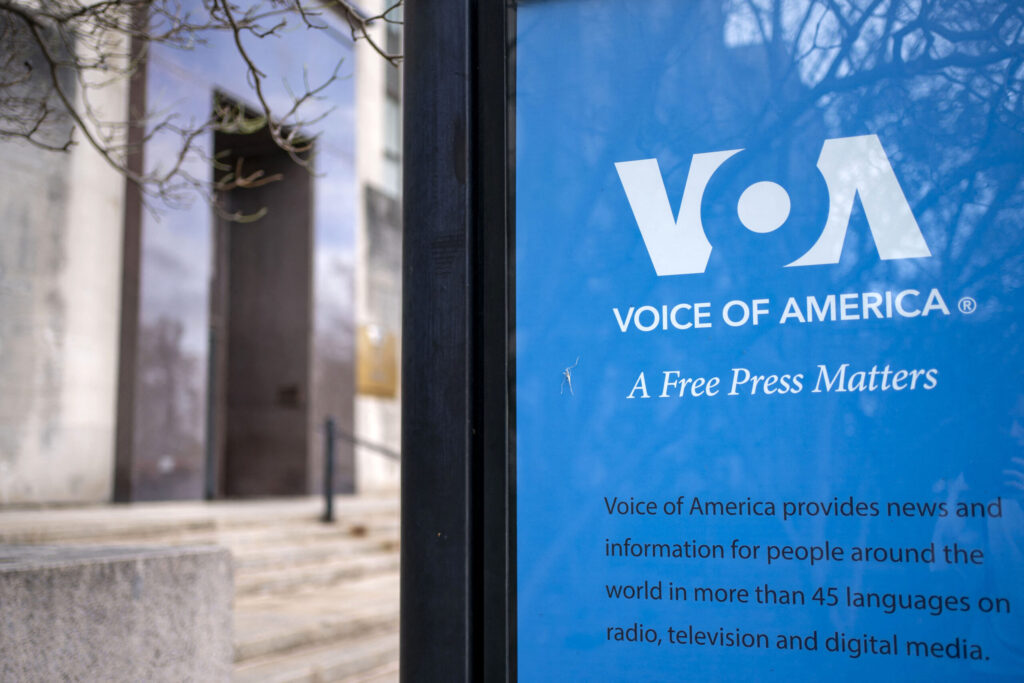As China and Russia intensify their global propaganda and disinformation efforts, employing media manipulation and cyberattacks to undermine credible journalism and weaken democracy and the international order, the world increasingly relies on the expertise of Voice of America (VOA) and Radio Free Europe/Radio Liberty (RFE/RL). However, on March 14, President Donald Trump issued an order to minimize the operations of the U.S. Agency for Global Media (USAGM), the organizations’ governing body, stating that these functions “shall be eliminated to the maximum extent consistent with applicable law.”
The day after, Kari Lake, a former local news host and pro-Trump political figure, who has recently taken on the role of senior advisor to USAGM’s acting CEO, sent a letter to RFE/RL’s management, demanding the cessation of “all activities” and immediate refunds of any unused funds. Concurrently, USAGM suspended VOA’s operations, leading to over 1,000 broadcasters being placed on administrative leave, with some employees being dismissed without cause. This abrupt action could significantly undermine one of America’s notable foreign policy endeavors. Nevertheless, RFE/RL intends to fight back. On March 14, its board sent a letter to Secretary of State Marco Rubio, asserting the necessity of its work for “advancing American national interests.” Established as a nonprofit, RFE/RL filed a lawsuit on March 18, arguing that funding choices are non-negotiable per legal obligations. Reports from CNN reveal that RFE/RL, Radio Free Asia, and Middle East Broadcasting Networks continue their broadcasts, as leaders deem the shutdown orders unlawful.
A Legacy of Truthful Broadcasting
Throughout its 80-year history, VOA has been a key American voice worldwide, reaching an estimated weekly audience of 345 million through broadcasts in almost 50 languages. Beginning in 1942 during World War II, VOA’s first message to the German audience emphasized its commitment: “We bring you the voices of America… Today, and daily from now on, we shall speak to you about America and the war… But we shall tell you the truth.” This unwavering dedication to factual journalism has remained foundational to its broadcasting mission over the decades.
The VoA Charter and Its Historical Context
In the 20th anniversary address of VOA, President John Kennedy emphasized the obligation to represent U.S. narratives truthfully, embracing both strengths and flaws. This ethos shaped the VOA Charter (Public Law 94-350), enacted on July 12, 1976, which dictates:
- VOA will serve as a reliable source of news, ensuring accuracy and objectivity.
- VOA will represent a broad spectrum of American society, portraying balanced and comprehensive American thoughts and institutions.
- VOA will effectively communicate U.S. policies and offer responsible discourse around them.
VOA has consistently upheld these high standards, covering major events such as the civil rights movement and the Watergate scandal, while also highlighting U.S. achievements in culture and science. Its impact was exemplified by the late Willis Conover, known globally as the “voice of American music,” whose broadcasts significantly contributed to U.S. cultural diplomacy.
RFE/RL and Its Role in Supporting Democracy
Established in the early 1950s, Radio Free Europe and Radio Liberty aimed to offer reliable, fact-driven news to audiences lacking press freedom. Unlike other broadcasters, RFE/RL sought to be “local home media,” fostering close connections with listeners. Lech Walesa, in a letter celebrating the Polish Service’s anniversary, articulated RFE’s crucial role during Poland’s democratic opposition in the 1980s: it served as a “ministry of culture” and “ministry of information” during critical times.
Challenges and Resilience
Despite their significance to U.S. national security, both VOA and RFE/RL faced scrutiny through the years. While not challenged in purpose, VOA was sometimes targeted for its content by figures like Senator Joseph McCarthy. In contrast, RFE/RL faced existential threats multiple times, leading to budgetary reviews and changes in funding sources, but it managed to maintain operations through negotiations and adaptations. Eventually, the 1994 International Broadcasting Act consolidated and stabilized U.S. international broadcasting efforts, preserving RFE/RL at critical historical moments.
As of March 2025, every administration has acknowledged the importance of VOA and RFE/RL, reforming and refining operations while underscoring their role in national security. However, Trump’s recent actions to dismantle U.S. international broadcasting threaten to weaken American global influence and bolster adversarial regimes, particularly as Russia and China enhance their media outreach.
To maintain national safety and promote U.S. values of freedom and democracy, it is essential for the United States to support and uphold its voices abroad. Voice of America and Radio Free Europe/Radio Liberty are vital instruments in this endeavor, embodying the expertise required to effectively engage with a global audience.



